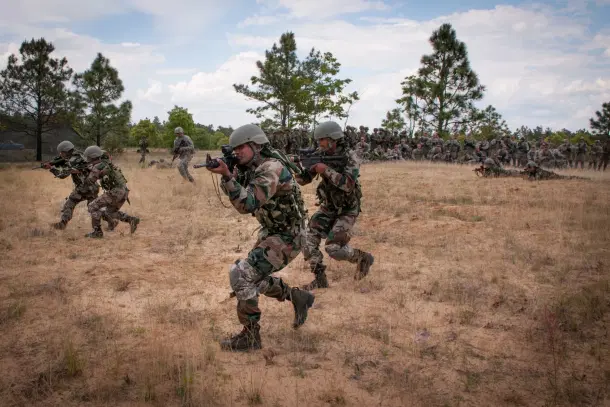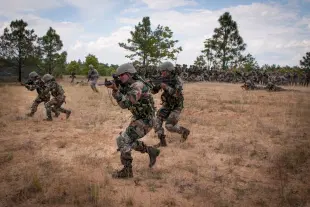Politics
India’s New Counterterrorism Doctrine Ends The UPA Era's False Binary Of Diplomacy Or Deterrence
Aditya Chaturvedi
Oct 27, 2025, 01:10 PM | Updated 01:15 PM IST
Save & read from anywhere!
Bookmark stories for easy access on any device or the Swarajya app.


In October of 1984, specifically between the dates of 9 and 12 October, the Grand Hotel in Brighton, England was going to host the UK's annual Conservative Party Conference. But the aforementioned dates became infamous as in the early hours of 12 October a bomb explosion took place in which five people were killed, including the Conservative MP Sir Anthony Berry. The primary target of the bombing, the then Prime Minister, Margaret Thatcher escaped unscathed.
Besides the carnage, what became memorable was the grim warning given by the perpetrators, the Provisional Irish Republican Army (IRA): 'Ms, Thatcher today we were unlucky, but remember, we only have to be lucky once, you will have to be lucky always'.
This warning became the axiom which underscores the vastly random and asymmetric nature of terrorism, in which the odds are stacked in favour of militants, which requires the presence of a strong state with an unflinching approach on counter-terrorism.
Situations similar to the IRA's warning often causes massive psychological demoralisation, anxiety, panic, trauma, and fear psychosis; the effects they have on ordinary people prompted Israeli historian Yuval Noah Harari to compare terrorism to a theatre or a spectacle.
The sheer uncertainty and the belief that you are not safe anywhere is the biggest psychological weapon of indoctrinated terror groups.
The State's Primary Responsibility
Ever since the principles guiding governance were first formulated, encompassing the insights of Chanakya and Machiavelli, maintaining both internal and external security have been the primary non-negotiable responsibility of the person in charge.
Peace, harmony and stability are the prerequisites for the pursuit of life, liberty, and happiness. It is for this reason that governments are instituted.
If all those factors are taken into context, the record of the UPA tenure was not just abysmal, it resembled the scenario of an absent state that failed to thwart terror attacks in the mainland, which was neither in the midst of a conflict nor in the throes of upheavals or periods of cyclic violence.
Between 2004-2012, the national capital New Delhi was hit twice by terror attacks, in 2005 and 2008. Mumbai, the country's financial hub renowned for its cosmopolitanism, witnessed a gruesome orgy of violence by Pakistan-sponsored terrorists in 2008.
The terror operatives entered India via boats due to a stark intel failure to intercept. 26/11 and the government's litany of follies, omissions, and attempt at trivialisation seared the conscience of the entire nation.
The rage, shock, and sense of helplessness and futility amongst the people then cannot not be put into words. Bombs detonated in markets, bakeries, and railway stations, across Jaipur, Pune, Patna.
The then government's mix of ineptitude, indifference, myopia, and denial, was only surpassed by their inaction, laced in the grammar of diplomacy, deterrence, feigned moral posturing, and grandstanding.
False Choices
In his 2016 insider account Choices: The Making of India's Foreign Policy, Shivashankar Menon, India's National Security Advisor during the 26/11 Mumbai attacks, writes the following: The aftermath of the Mumbai attack also revealed the limits of diplomacy. Just as force has limited utility in these situations, so does diplomacy. While force is limited in its uses by objective factors, diplomacy is limited by selfish calculations of sovereignty by each nation state.
The 'either/or' exclusivity between military action and diplomacy, was not just absurd, but a false binary that served as a post facto justification.
The current government's zero tolerance policy for terrorism, which includes clamping down on religious radicalism and cross-border infiltration, not being held hostage to the nuclear blackmail, and punitive measures, demonstrates that diplomacy is best conducted through a position of strength, resolve, and setting terms of engagement, instead of being passive to the rules of the game.
In that context, Operation Sindoor serves as a fine example when in the words of defence analyst John Spencer: "Indian leaders emphasised that terrorism would no longer be treated as isolated acts, and that those who support or enable such violence would also be held accountable."
Costly Mistakes and Old Ghosts
Since the past decade, terror acts have drastically reduced in India, including the sensitive region of Jammu & Kashmir (J&K), long a hotbed of separatist militancy and religious fundamentalism.
As per data from Statista, the number of terror incidents in J&K are their lowest in 25 years. Maoist terror in the central Indian states is also breathing its last.
The number of militants laying down arms is increasing owing to a multi-pronged strategy that focuses on eliminating the scourge of terrorism as well as rehabilitation and community development.
Through integrated joint operations, near real-time intel sharing, establishing new National Security Guard (NSG) centres, equipping the multi-agency centres and their state-level units with cutting edge technology and analytics, terror attacks have been reduced.
One of the biggest reasons for the spate of terror attacks in civilian areas in the mid-2000s was operational silos in intel agencies, limited coordination, lack of technology adoption, and above all no political will to raise the cost of terrorism on those inflicting it who swear by doctrines such as 'salami slicing' and 'bleeding by a thousand cuts'.
Real deterrence is only established when the threshold is not breached, signalling is clear and coherent, reprisal swift and calibrated, and the contours of engagement are redefined.
It was the failure of geopolitical imagination of the UPA and clinging to warped patterns of thinking that emboldened Pakistan to tread on the similar path. The toll was immense and paid in blood of civilians.
This stands in stark contrast to the bold, decisive and swift retaliatory response by the incumbent Modi government.
Counter terrorism is not a variable in the matrix of international relations that can be aligned like lego blocks as per whims, it is a critical constant.





